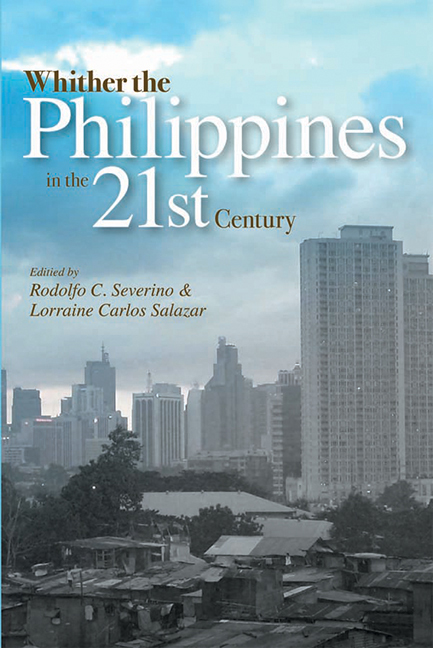Book contents
- Frontmatter
- Contents
- List of Illustrations
- Foreword
- Acknowledgements
- The Contributors
- List of Abbreviations
- Map of Southeast Asia
- 1 The Philippines in Southeast Asia
- 2 From Regime Crisis to System Change
- 3 Proposed Constitutional Reforms for Good Governance and Nation Building
- 4 The Military in Philippine Politics
- 5 Religion and Politics
- 6 The Philippine Press
- 7 Macroeconomic Issues and Challenges
- 8 Investment Climate and Business Opportunities
- 9 Why Does Poverty Persist in the Philippines?
- 10 Diaspora, Remittances, and Poverty
- 11 The Philippine Development Record
- 12 Sancho Panza in Buliok Complex
- 13 The Insurgency That Would Not Go Away
- 14 Whither the Philippines in the 21st Century?
- Index
3 - Proposed Constitutional Reforms for Good Governance and Nation Building
Published online by Cambridge University Press: 21 October 2015
- Frontmatter
- Contents
- List of Illustrations
- Foreword
- Acknowledgements
- The Contributors
- List of Abbreviations
- Map of Southeast Asia
- 1 The Philippines in Southeast Asia
- 2 From Regime Crisis to System Change
- 3 Proposed Constitutional Reforms for Good Governance and Nation Building
- 4 The Military in Philippine Politics
- 5 Religion and Politics
- 6 The Philippine Press
- 7 Macroeconomic Issues and Challenges
- 8 Investment Climate and Business Opportunities
- 9 Why Does Poverty Persist in the Philippines?
- 10 Diaspora, Remittances, and Poverty
- 11 The Philippine Development Record
- 12 Sancho Panza in Buliok Complex
- 13 The Insurgency That Would Not Go Away
- 14 Whither the Philippines in the 21st Century?
- Index
Summary
In the political struggle over the proposed amendments to the 1987 Constitution from 2004 to 2006, protagonists voiced divergent ideas, perceptions and opinions and their ideological and partisan preferences. The media actively participated not only to report on the events, the protagonists and the issues, but also to take sides in the debates and influence public opinion. The Catholic hierarchy and the largest and most influential media establishments — notably the Philippine Daily Inquirer and ABS-CBN radio and television — openly opposed the proposed reforms.
The proposed amendments were effectively opposed as selfishly motivated, unnecessary, defective, untimely, hastily done, and forced on a reluctant people and Senate. In effect the dominant opposition to proposing charter change through either the petition for a people's initiative or by Congress as a constituent assembly favoured the status quo in terms of the form, structure and processes of governance and the restrictive economic policies regarding foreign investments. The apparent agenda and vested interests of those who blocked the proposed reforms were largely obscured in the debates.
This chapter focuses at length and in substantive detail on the major proposals for constitutional reform and their stated advantages and justification, as well as summarizes the criticism and opposition of sceptics and opponents. The fierce yet peaceful struggle for and against constitutional reform ended in October to December 2006 in the decisions of the Supreme Court on the petition for a people's initiative and the failure of the majority in the House to push its amendments by a constituent assembly over the Senate's objections.
INTRODUCTION: CHARTER CHANGE FOR GOOD GOVERNANCE
In 2006 the public debate and controversy over proposals for charter change were focused mainly on the lone proposal to replace the presidential government and the bicameral Congress with a unicameral parliamentary government in the same year, or early in 2007. Prominently behind the proposal to amend the 1987 Constitution was the Sigaw ng Bayan (Cry of the People) Movement of citizens and local leaders initiated in Manila on 15 February 2006 under the leadership of Manila Mayor Lito Atienza.
- Type
- Chapter
- Information
- Whither the Philippines in the 21st Century? , pp. 43 - 77Publisher: ISEAS–Yusof Ishak InstitutePrint publication year: 2007



